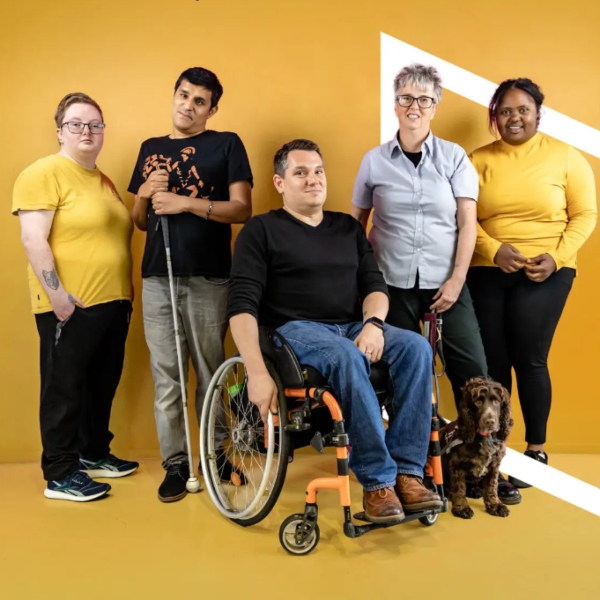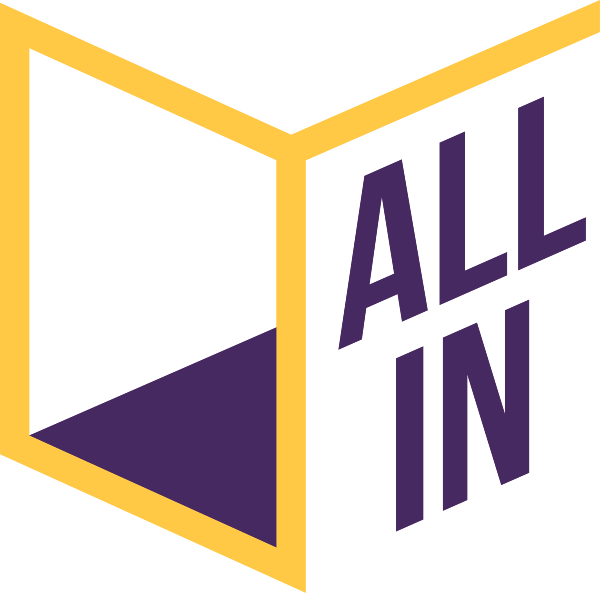
Tips for building accessibility into your marketing role
Tips for building accessibility into your marketing role
Lilit Movsisyan, Access Specialist, and Nicola Fieldsend, Senior Officer – Marketing and Communications at All In, are here to take you through some good habits to help you build in accessibility throughout your work. All In is the new access scheme for creativity and culture in the UK and Ireland.
All In is the new access scheme for creativity and culture in the UK and Ireland. It aims to remove barriers and improve experiences for deaf, disabled, and neurodivergent people. We want to help organisations like yours welcome more disabled people through your doors.
Marketing is a crucial tool for raising awareness of your venue and events. From website content to social media, to posters and leaflets, by making your marketing materials more accessible, you can increase the engagement of your content, increasing audience and visitor numbers.
In fact, improving your accessibility will benefit everyone, as access provisions are also used by a significant number of people who don’t identify as disabled. In the recent Access Culture Survey developed by Indigo Ltd in partnership with All In, we discovered 37% of non-disabled visitors make use of familiarisation tools, like photos and videos, building confidence before deciding to make a trip.
As accessibility becomes increasingly important to improving audience and visitor experiences, for marketing colleagues it can be overwhelming knowing where to start.
That’s why Lilit Movsisyan, Access Specialist, and Nicola Fieldsend, Senior Officer – Marketing and Communications at All In, are here to take you through some good habits to help you build in accessibility throughout your work.
1. Plan for access from the outset
Develop your marketing and comms plans with accessibility in mind. This will help you make the most of the resource you have, while also reducing last minute additions.
More people can attend events which are publicised early (at least one month’s notice), and with as much access information as possible. Include access provisions in your timeline, communicate these deadlines to your team and senior managers, ensuring everyone is aware of why these deadlines are important, and how you can work together to meet them.
Don’t forget to build turnaround times from suppliers into your comms plans. For example, requesting Easy Read or BSL videos or captions, which all add time onto your go-live dates. By factoring this in, you’ll have your accessible formats ready and available at the same time as your original content. The sooner you can include accessibility provisions in your promotions, the clearer your message will be. If a person with access requirements doesn’t have their needs met the first time they check, they’re unlikely to come back a second time.
2. Be transparent
There’s no such thing as “fully accessible”, as All In’s UK Arts Access Champion Andrew Miller shared in our recent Arts Professional article. Make sure your accessibility provisions are clearly listed with as much as detail as possible. Disabled people would much rather know if there’s a risk of a barrier before they turn up on the day!
It may seem counterintuitive to admit a lack of access, in fear of disappointing potential visitors, but it is vital that disabled people are able to make informed choices. This clarity saves time and energy. It reduces stress of not knowing and the burden of additional research or picking up the phone.
Make sure your accessibility is communicated through your website and signposted in other relevant channels. And don’t forget to share information with colleagues that might support customers in minimising and mitigating these barriers, such as front of house staff, customer service, or helpline colleagues.
3. Build good habits
As with most things, you’ll find you can create accessible content quicker and easier with practice. You could start by having a go at writing meaningful image descriptions for every social media post. Or you could commit to checking back over your copy to simplify your language with Plain English.
Carve out pockets of time for learning. Whether that’s a training course, or a short, bitesize video or attending a webinar, these learnings will build your confidence and stay with you throughout your career.
It’s often easier to train together: set a date in the diary and invite your colleagues. It might be easier to find the time for that training you keep putting off if you know others are coming too. Why not host a drop-in session to have a go at collaboratively improving the readability of your website copy?
Before you know it, accessible content becomes the default for your organisation, and you can share your learnings with new starters!
4. Collaborate with your community
There is much to learn when we come together as a sector and as communities. Engage in networks of good practice (such as the Arts Marketing Association!) to continue your learning and share your good practice with others.
Collaborate with local creative and cultural organisations to promote a diverse range of accessible performances and events catered to your communities.
Speak to disabled-led organisations or consultants with lived experience. Invite your audiences to share their experiences and make sure they compensated for their time (we recommend Unlimited’s Nothing for Nothing campaign for guidance.) Launching accessible surveys, clear feedback processes, and focus group activities are just some ways to include lived experience in your decision-making.
This input will help you better understand your audiences, as well as develop your marketing and customer service approaches. Not only can this help inform your priorities as a marketing team, but it’s a good way to build a case for additional accessibility budget in the future.
What next?
By subscribing to All In, you’ll be able to use our accessibility standards developed by disabled-led charity, Attitude is Everything. The All In standards are designed to bring clear, consistent guidance to creative and cultural organisations, including how to make your promotional material and marketing content more accessible, usable and inclusive.
All In is set to roll out from the second half of 2025, but until then, you can express your interest at allin.online.
For general advice, we recommend you check out Unlimited’s accessible marketing guide.


















